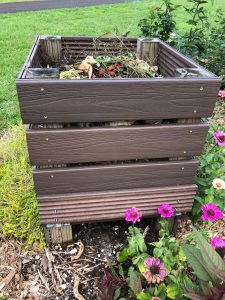
Compost bins can be built or purchased and provide an easy means of recycling food and yard waste into valuable soil for a garden. Photo credit: Carrie Stevenson, UF/ IFAS Extension
What better New Year’s resolution could there be than to start recycling and do our part to preserve our natural resources? By composting yard and kitchen waste, we can also get a jump-start on our spring gardening by creating your own mulch and fertilizer. Done properly, raw compost material can transform into nutrient-rich soil in just six weeks! A free source of “slow release” nutrients, compost also loosens tight, compacted soils and helps our often-sandy soils hold nutrients.
So what is compost? Essentially, it is what’s left of organic matter after it’s been thoroughly decomposed by microbes. Among the common compostable organic materials are leaves, grass clippings, twigs, pine straw, and vegetable/fruit peelings and coffee grounds. When using these items, alternate by using brown (leaves, straw) and green materials (grass clippings, vegetables) in the compost bin to provide adequate carbon and nitrogen. Table scraps containing meat, eggs or oils are not recommended because they can draw rodents and cause an odor. Eggshells are OK, but in general, use only kitchen scraps that are either plants or paper.
The organisms doing the actual composting are microscopic bacteria and fungi, along with earthworms. The microbes need water, oxygen and nutrients to thrive. Rainfall will provide most of the needed moisture, although you may need to hand water the pile on during dry times. For the best results, keep the pile moist but not soggy; if you pick up a handful it should not crumble away nor drip water when squeezed.
To move oxygen through the pile, increasing decomposition and preventing odors, turn the pile on a regular basis with a pitchfork or rake. Some companies sell compost bins in moving cylinders that can be turned with a handle. The process of decomposition will generate extreme heat (over 150°F in the summer) within the pile, which can kill weed seeds and disease-causing organisms.
Done correctly, composting does not smell bad, is very easy to do, and is a great way to do something good for the planet, your yard, and your wallet! Learn more about composting at this University of Florida Extension article.
- The Assassin Bug–A Beneficial Garden Visitor - January 15, 2026
- Wax Myrtle–a Native Evergreen - December 26, 2025
- Yucca–A Tough and Versatile Native Plant - November 26, 2025
